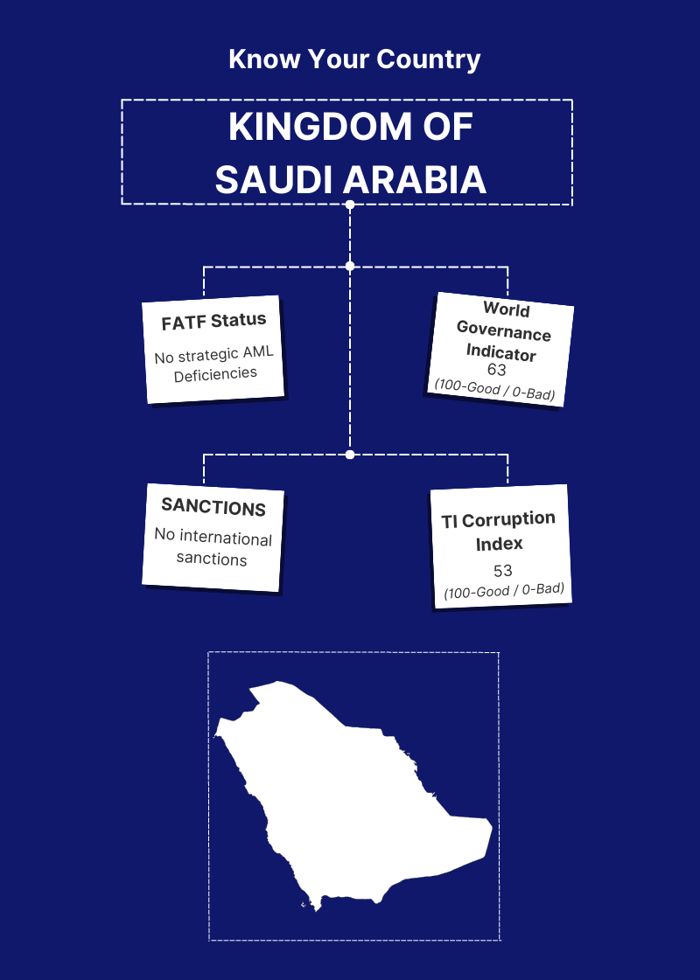In recent years, the importance of Anti-Money Laundering (AML) compliance has grown significantly in Saudi Arabia. As a key player in the global financial landscape, the country is committed to combating financial crimes and ensuring the integrity of its financial system. AML compliance is crucial for maintaining transparency, mitigating risks, and protecting against money laundering, terrorist financing, and other illicit activities.
Implementing AML compliance measures in Saudi Arabia comes with its own set of challenges. The complex regulatory landscape, evolving regulations, and the need to keep up with international standards pose significant hurdles for financial institutions. Additionally, ensuring the effectiveness of AML programs, detecting emerging risks, and managing compliance costs are ongoing challenges faced by organizations operating in the country.
Tookitaki is a trusted and leading provider of AML compliance solutions, offering cutting-edge technology and advanced analytics to assist financial institutions in meeting their AML obligations. With its innovative solutions, Tookitaki helps organizations address the challenges of implementing AML compliance in Saudi Arabia by streamlining processes, enhancing detection accuracy, and ensuring compliance with regulatory requirements. By leveraging Tookitaki's expertise, financial institutions can optimize their AML programs and strengthen their overall compliance framework.
Regulatory Landscape in Saudi Arabia
Regulatory Framework for AML Compliance in Saudi Arabia
Saudi Arabia has established a comprehensive regulatory framework to combat money laundering and terrorist financing. The key regulatory bodies responsible for enforcing AML compliance include:
- Saudi Arabian Monetary Authority (SAMA): SAMA is the central bank of Saudi Arabia and plays a vital role in setting and enforcing AML regulations for financial institutions.
- Capital Market Authority (CMA): CMA regulates and supervises the capital market in Saudi Arabia, including securities firms and investment funds, and ensures compliance with AML requirements.
- Saudi Arabian Financial Investigation Unit (SAFIU): SAFIU is the financial intelligence unit in Saudi Arabia responsible for receiving, analyzing, and disseminating suspicious transaction reports (STRs) to combat money laundering and terrorist financing.
Key Regulations and Requirements
Financial institutions operating in Saudi Arabia must adhere to various regulations and requirements to maintain AML compliance. Some of the key regulations include:
- Anti-Money Laundering Law: The Anti-Money Laundering Law outlines the legal framework for combating money laundering and terrorist financing activities in Saudi Arabia.
- Know Your Customer (KYC) Requirements: Financial institutions must implement robust KYC procedures to verify the identity and assess the risk of their customers.
- Suspicious Transaction Reporting: Financial institutions are required to report any suspicious transactions or activities to SAFIU in a timely manner.
- Customer Due Diligence (CDD): Financial institutions must perform thorough due diligence on their customers, including ongoing monitoring of customer transactions and risk assessments.

Challenges Faced by Financial Institutions
Meeting the regulatory obligations for AML compliance in Saudi Arabia can present several challenges for financial institutions, including:
- Evolving Regulations: The regulatory landscape is constantly evolving, with new regulations and guidelines being introduced. Financial institutions need to stay updated and adapt their AML programs accordingly.
- Cross-Border Transactions: Saudi Arabia's position as an international financial hub means financial institutions often deal with cross-border transactions, requiring them to navigate complex international AML regulations.
- Resource Constraints: Implementing and maintaining an effective AML compliance program requires significant resources, including skilled personnel, advanced technology, and ongoing training.
- Risk Assessment and Monitoring: Financial institutions must accurately assess and monitor their customer's risk profiles to detect and prevent money laundering and terrorist financing activities.
Challenges in AML Compliance Implementation
Financial institutions in Saudi Arabia often face challenges in developing robust and effective AML programs due many factors.
- Building a strong AML program requires expertise in areas such as risk assessment, transaction monitoring, and regulatory compliance. However, many financial institutions may lack the necessary in-house expertise to develop and implement comprehensive AML frameworks.
- Allocating sufficient resources, including skilled personnel, technology infrastructure, and training, can be a challenge for financial institutions, especially smaller organizations with limited budgets.
- Identifying and monitoring complex transactions that involve multiple parties, layered transactions, or digital currencies can be challenging. These transactions may be designed to obfuscate the origin and destination of funds.
- Financial institutions need to stay ahead of emerging risks, including new techniques used by criminals to launder money or finance illegal activities. This requires ongoing monitoring and updating of AML strategies and technologies.
- AML regulations in Saudi Arabia and globally undergo frequent updates and revisions to address emerging threats. Financial institutions must stay updated and ensure their AML programs align with the latest regulatory requirements.
- Interpreting and implementing complex AML regulations can be challenging, as it requires a deep understanding of the legal framework and its practical application.
- Ensuring the accuracy, completeness, and reliability of data used for AML monitoring and reporting is essential. Financial institutions must have robust data management processes to address data quality issues.
- Financial institutions often deal with data from multiple sources, such as transaction data, customer information, and external data feeds. Integrating and consolidating this data in a meaningful way can be complex.
How Tookitaki Can Help
Tookitaki offers a comprehensive AML solution -- the Anti-Money Laundering Suite (AML Suite) -- that empowers financial institutions in Saudi Arabia to combat money laundering and financial crime effectively. Its solution combines advanced machine learning algorithms, data analytics, and automation to enhance detection accuracy, streamline compliance processes, and ensure regulatory compliance.
The AML Suite operates as an end-to-end operating system, covering various stages of the compliance process, from initial screening to ongoing monitoring and case management. Banks and fintechs can achieve a seamless workflow, eliminate data silos, and ensure consistent compliance across different modules by having a cohesive and integrated system. The end-to-end approach enhances operational efficiency, reduces manual efforts, and facilitates a more holistic view of AML compliance, enabling financial institutions to stay ahead of evolving risks.
Modules within the AML Suite
Smart Screening Solutions
- Prospect Screening: This module enables real-time screening capabilities for prospect onboarding. By leveraging smart, AI-powered fuzzy identity matching, it reduces regulatory compliance costs and exposure to risk. Prospect Screening helps financial institutions detect and prevent financial crime by screening potential customers against various watchlists, including sanctions lists, PEP databases, and adverse media. The solution provides efficient and streamlined screening processes, reducing false positive hits and assisting compliance specialists in various scenarios.
- Name Screening: Tookitaki's Name Screening solution utilizes machine learning and Natural Language Processing (NLP) techniques to accurately score and distinguish true matches from false matches across names and transactions, in real-time and batch mode. The solution supports screening against sanctions lists, PEPs, adverse media, and local/internal blacklists, ensuring comprehensive coverage. With 50+ name-matching techniques, support for multiple attributes like name, address, gender, and a built-in transliteration engine, Name Screening provides razor-sharp matching accuracy. The state-of-the-art real-time screening architecture reduces held transactions and improves straight-through processing (STP) for a seamless customer experience.
Dynamic Risk Scoring
- Prospect Risk Scoring: Prospect Risk Scoring (PRS) is a powerful solution that enables financial institutions to onboard prospects with reduced regulatory compliance costs and risk exposure. By defining a set of parameters that correspond to the rules, PRS offers real-time risk scoring capabilities. Financial institutions can leverage PRS to take initial scope, including factors such as address, nationality, gender, occupation, monthly income, and more, into account for risk scoring. The configurable scores for risk categories allow financial institutions to streamline the prospect onboarding process, make informed decisions, and mitigate risks effectively.
- Customer Risk Scoring: Tookitaki's Customer Risk Scoring (CRS) is a core module within the AML Suite, powered by advanced machine learning. CRS provides scalable customer risk rating by dynamically identifying relevant risk indicators across a customer's activity. The solution offers a 360-degree customer risk profile, continuous on-demand risk scoring, and perpetual KYC for ongoing due diligence. With actionable insights based on customer risk scores, financial institutions can make accelerated and informed decisions, ensuring effective risk mitigation.
Transaction Monitoring
Tookitaki's Transaction Monitoring solution is the most comprehensive in the industry, utilizing a first-of-its-kind industry-wide typology repository and AI capabilities. It provides comprehensive risk detection and efficient alert management, offering 100% risk coverage and the ability to detect new suspicious cases. The solution includes automated threshold management, reducing the manual effort involved in threshold tuning by over 70%. With superior pattern-based detection techniques, leveraging typologies that represent real-world red flags, Transaction Monitoring helps financial institutions safeguard against new risks and threats effectively.
Case Manager
The Case Manager within Tookitaki's AML Suite provides compliance teams with a collaborative platform to work seamlessly on cases. The Case Manager includes automation that empowers investigators by automating processes such as case creation, allocation, and data gathering. Financial institutions can configure the Case Manager to improve operational efficiency, reduce manual efforts, and enhance overall effectiveness in managing and resolving cases.
How Tookitaki's Solutions Address AML Compliance Implementation Challenges in Saudi Arabia
Tookitaki's solutions specifically address the challenges faced by financial institutions in Saudi Arabia during the implementation of AML compliance measures:
- Expertise and Resource Constraints: Tookitaki's advanced technology bridges the expertise gap by offering comprehensive AML capabilities. It enables financial institutions to leverage sophisticated AML tools without the need for extensive in-house resources.
- Complexity of Monitoring: Tookitaki's transaction monitoring solution, powered by community insights, enhances monitoring capabilities, allowing financial institutions to detect and investigate complex financial crime activities effectively.
- Compliance with Evolving Regulations: Tookitaki's solutions are designed to adapt to changing regulatory requirements. The platform can be easily configured to incorporate new regulations, ensuring ongoing compliance with the evolving AML landscape.
- Data Integrity and Integration: Tookitaki's technology includes data quality controls and facilitates the integration of disparate data sources. This ensures the accuracy and reliability of data used for AML monitoring and reporting purposes.
Tookitaki's AML compliance solutions provide financial institutions in Saudi Arabia with a robust and comprehensive framework to address the challenges of AML compliance implementation. By leveraging advanced technology, financial institutions can enhance their compliance capabilities, reduce risks, and effectively combat financial crimes in a dynamic regulatory environment.
Benefits of Using Tookitaki's Solutions
Enhanced Detection Accuracy and Reduced False Positives
Tookitaki's advanced AML compliance solutions leverage artificial intelligence and machine learning algorithms to enhance detection accuracy. By analyzing vast amounts of data and applying sophisticated risk models, the solutions can identify suspicious activities with higher precision. This leads to a reduction in false positives, enabling investigators to focus on genuine threats.
Streamlined Compliance Processes and Increased Operational Efficiency
With Tookitaki's solutions, financial institutions can streamline their AML compliance processes. Automated features like intelligent transaction monitoring and case management help optimize workflows and improve efficiency. Financial institutions can allocate resources effectively and focus on critical compliance tasks by reducing manual efforts and enhancing operational processes.
Cost Savings and Resource Optimization
Implementing Tookitaki's AML compliance solutions can result in significant cost savings and resource optimization for financial institutions. The automated processes reduce the need for manual intervention and minimize the risk of human error. By leveraging advanced technology, financial institutions can efficiently manage their AML compliance efforts and allocate their resources more strategically.
By utilizing Tookitaki's solutions, financial institutions in Saudi Arabia can benefit from enhanced detection accuracy, streamlined compliance processes, compliance with regulatory requirements, and cost savings. These advantages enable financial institutions to strengthen their AML compliance frameworks, mitigate risks, and safeguard their operations against financial crimes.
Final Thoughts
Implementing AML compliance in Saudi Arabia comes with various challenges, including a lack of expertise and resources, complexity in monitoring financial crime activities, compliance with evolving regulations, and ensuring data accuracy. These challenges can hinder financial institutions' ability to combat money laundering and terrorist financing effectively.
Tookitaki's advanced AML compliance solutions offer a powerful solution to overcome the challenges faced in AML compliance implementation. With their cutting-edge technology, these solutions enhance detection accuracy, streamline compliance processes, ensure regulatory compliance, and optimize resource allocation. Financial institutions can rely on Tookitaki's expertise to strengthen their AML compliance frameworks and effectively address evolving risks.
Financial institutions in Saudi Arabia are encouraged to explore Tookitaki's comprehensive suite of AML compliance solutions. By contacting Tookitaki for further information or requesting a demo, they can gain valuable insights into how Tookitaki's solutions can transform their AML compliance efforts. It's time to take proactive steps towards robust AML compliance with Tookitaki's innovative technology.
Anti-Financial Crime Compliance with Tookitaki?





